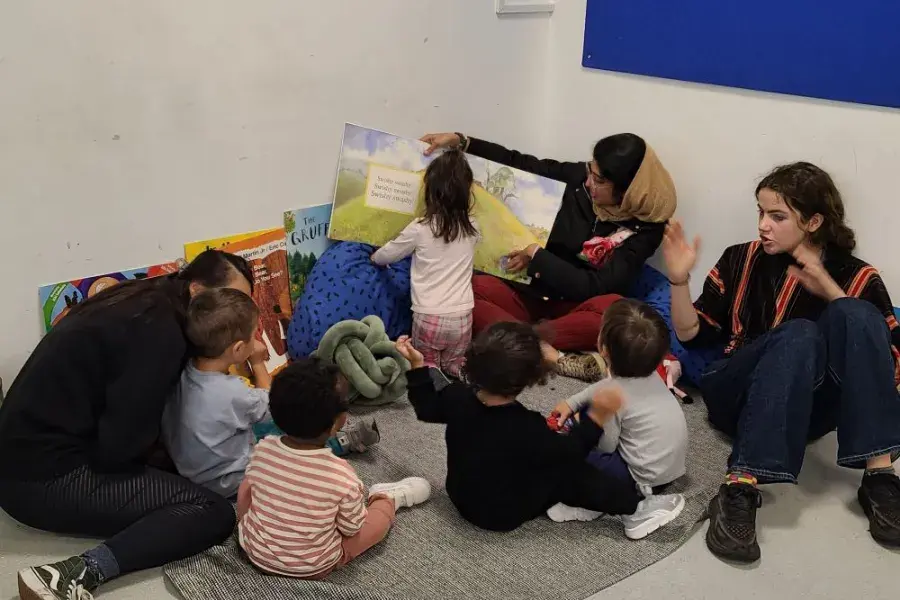From Playtime to Podium: Cultivating Leadership in Neurodiverse Children
“The art of communication is the language of leadership”- James Humes
We’re thrilled to introduce a fresh perspective in our ongoing series, How to Communicate More Effectively When There’s Neurodiversity! This month we’re exploring the powerful connection between communication and leadership - two skills that go hand in hand at every stage of development.
Imagine a child named Sam, a bright, curious boy who is pre-verbal. Sam’s mother, aware of his need to feel empowered, involves him in planning their weekly outings. By presenting two picture cards - one for the park and one for the library - Sam learns to make decisions and see the results of his choices. Over time, these seemingly small moments spark confidence, accountability, and the budding traits of leadership.
Leadership isn’t just about taking charge; it’s about inspiring others, collaborating effectively, and finding your voice, whether verbal, non-verbal, or somewhere in between. In this article, we’ll explore how foundational communication tools can nurture early leadership skills and foster confidence - particularly for children with diverse communication needs.
Leadership is often seen as an innate ability, but the truth is, leadership can be taught, nurtured, and developed from a young age. For parents raising Neurodiverse children, this concept might feel daunting. After all, what does leadership look like in a child who struggles with verbal communication, sensory processing, or social interaction? The answer lies in adapting leadership skills to their unique strengths and challenges, while modelling these behaviours in ways that resonate with their world.
Leadership is not about commanding a room or giving a speech. For Neurodiverse children, it’s about learning to navigate challenges, connect meaningfully with others, and understand their own potential. Here’s how you can nurture these skills in ways tailored to their needs.
Understanding Leadership Through a Neurodiverse Lens
For many Neurodiverse children, leadership begins not with words but with actions, relationships, and choices. Here are the foundational skills parents can focus on:
- Communication: While verbal expression might be limited, other methods - such as picture exchanges, sign language, or gestures - can teach children how to express their needs and ideas effectively. Sam, for instance, learned to use Makaton signs to share his preferences, creating a bridge between his thoughts and those around him.
- Problem-solving: Neurodiverse children often encounter unique challenges, from sensory sensitivities to rigid thinking patterns. Parents can help by breaking problems into manageable steps and celebrating small victories.
- Empathy: Even children who struggle with social cues can learn empathy when it’s modelled through play or storytelling. Reading books with relatable characters, discussing feelings, or re-enacting scenarios with toys can provide a safe space to explore emotions.
- Decision-making: Start small. Let them choose between two shirts, two snacks, or two activities. Each decision builds confidence and helps them learn that their voice matters.
Leading by Example: Modelling Leadership for Neurodiverse Children
Children, regardless of their abilities, are always watching. How you navigate life teaches them invaluable lessons. Consider these strategies:
- Empathy in Action: When Sam had a sensory meltdown in a crowded store, his mother calmly knelt down, held his hand, and whispered
reassuringly. This not only calmed Sam but showed him that kindness and patience are powerful tools in the face of challenges. - Decision-making Transparency: Include your child in your thought processes. For example, explain why you’re choosing to leave early for an
appointment or how you’re planning dinner. Hearing these steps helps them understand structured decision-making. - Accountability: If you make a mistake, own it. Apologise and explain how you’ll do better next time. This models humility and responsibility - essential traits for any leader.
Providing Opportunities for Responsibility
For Neurodiverse children, responsibility must be introduced gradually and intentionally. Here’s how to build it into their daily lives:
- Start Small: Give them simple, achievable tasks that match their developmental level. Sam, for example, enjoyed putting his toys into labelled bins. This chore not only taught him organisation but gave him a sense of accomplishment.
- Create Leadership Moments at Home: Even small decisions, like choosing the family movie night snack, can make a child feel valued.
- Foster Independence: If your child uses assistive tools like a visual schedule, involve them in setting it up. This builds autonomy while reinforcing routines.
The Role of Teamwork in Leadership
Leadership thrives in collaboration. Encourage your child to engage with others in ways that feel comfortable:
- Join Inclusive Groups: Look for activities, clubs, or after-school programmes that accommodate Neurodiverse children (such as My Junior Tribe). These settings help build teamwork and communication skills.
- Volunteer Together: Acts of service, such as delivering food donations or helping a neighbour, teach children how to lead with compassion and initiative. For example, check out https://www.familyvolunteeringclub.co.uk/
- Support Peer Interactions: Arrange playdates or small group activities where your child can practice sharing, turn-taking, and cooperative play. For more thinking on fostering leadership in children, visit https://parent-leaders.com/
Fostering Core Values for Leadership
Strong leadership rests on solid values. As a parent, you are your child’s first teacher of these principles:
- Integrity: Be honest with your child, even about your own struggles. This shows them the importance of authenticity.
- Respect: Model how to value others’ perspectives, even when they differ from your own. For instance, when Sam’s siblings wanted to play a noisy game, his mother facilitated a compromise, ensuring everyone felt heard.
- Active Listening: Neurodiverse children often find it challenging to wait their turn to speak. Practice turn-taking during conversations, and emphasise the importance of truly hearing others.
A Leadership Journey Tailored to Every Child
Raising a leader doesn’t mean moulding your child into a specific ideal. It means embracing who they are, celebrating their strengths, and equipping them to overcome challenges. For pre-verbal children like Sam, leadership might not look like giving speeches or organising a group. It might be as simple - and profound - as learning to express themselves, make choices, and connect with others on their own terms.
Parenting a Neurodiverse child requires patience and creativity, but it also brings unparalleled rewards. By modelling empathy, fostering decision-making, and teaching essential values, you can help your child step into their unique leadership potential. Remember, every leader starts small, with one decision, one act of kindness, or one moment of courage - and grows from there.
Join us at My Junior Tribe at Mint Street Adventure Playground SE1 on Mondays from 3:30-5:00pm during term time. My Tribe is a safe, fun and supportive after school club for Neurodiverse children aged 6 to 11. Together, we explore how communication fosters confidence, collaboration, and the ability to lead in their own unique ways. Our activities are run by trained and professional adults who have a thorough knowledge and understanding of how to best support Neurodiverse children for best outcomes.
Image by asier_relampagoestudio on Freepik




